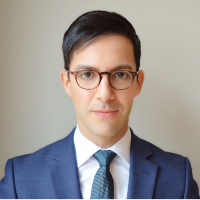Iran: The Battle for the Presidency
Three Iran experts discussed the June 14 presidential elections in Iran. They discussed the candidates, their platforms, and their impact on future domestic and foreign policy.
On May 23, the Middle East Program hosted a meeting, “Iran: The Battle for the Presidency,” with Barbara Slavin, Senior Fellow at the Atlantic Council’s South Asia Center and Washington Correspondent at Al-Monitor.com; Ali Vaez, Senior Iran Analyst at the International Crisis Group; and, via Skype from Israel, Meir Javedanfar, an Iranian-Israeli Middle East Analyst and Iranian Politics Lecturer at the Interdisciplinary Center at Herzliya, Israel. Haleh Esfandiari, Director of the Middle East Program at the Woodrow Wilson Center, moderated the event.
Vaez discussed the Guardian Council’s decision to bar former president Akbar Hashemi Rafsanjani from running in this year’s elections on June 14. According to Vaez, this decision was not unexpected because the regime in Iran has always excluded candidates that offer a challenge to their ideological and political hegemony. In addition, he said the regime in Iran is carefully guiding this election to prevent a repeat of the unrest that followed the 2009 presidential elections. Vaez argued that the regime has spent the last few years isolating Rafsanjani and his supporters, and it made its intentions in this year’s election clear. That withstanding, in the following weeks, the list of eight approved candidates is likely to boil down to a few main contenders, including reformist candidate Hassan Rowhani and conservative candidates Saeed Jalili, Ali Akbar Velayati, and Mohammad Bagher Qalibaf. For Vaez, the election in Iran will be a contest to first and foremost “win the hearts and minds” of the Supreme Leader and then the people.
According to Slavin, the close management of this election is part of a broader movement within Iran to marginalize the office of the presidency. Similar to last year’s parliamentary elections, the regime will limit popular participation, canceling televised debates and probably campaign rallies to keep voter turnout and excitement low. That way, she said, they do not risk the same emotional release and feelings of disappointment that followed in the aftermath of the 2009 election. For Slavin, placing exaggerated hopes on Rafsanjani’s bid for the presidency was misguided because this time around, the regime has made it sufficiently clear they will not tolerate candidates who offer alternative policies or agendas for the country.
For Javedanfar, Rafsanjani’s disqualification came as a surprise because most people believed that he had received Ayatollah Khamenei’s approval to run. According to Javedanfar, allowing Rafsanjani to compete would have prompted greater voter turnout and bolstered the legitimacy of the elections. Nonetheless, he said Khamenei decided to support a candidate who does not threaten to divide the regime. For Khamenei, the candidate that offers this stability is Saeed Jalili, a powerful figure who is a member of the Supreme National Security Council and Iran’s chief nuclear negotiator. He has been consistent in his support for the Supreme Leader and has managed to maintain the image of being honest and incorruptible. Therefore, according to Javedanfar, he is most likely the frontrunner in Iran’s race, as he will receive the support of some of the most powerful actors in Iranian politics: The Office of the Supreme Leader, the Islamic Revolutionary Guard Corps (IRGC), and the Guardian Council.
By Darya Razavi, Middle East Program
Speakers
Senior Fellow, Atlantic Council's South Asia Center and Washington correspondent for Al-Monitor.com

Hosted By

Middle East Program
The Wilson Center’s Middle East Program serves as a crucial resource for the policymaking community and beyond, providing analyses and research that helps inform US foreign policymaking, stimulates public debate, and expands knowledge about issues in the wider Middle East and North Africa (MENA) region. Read more
